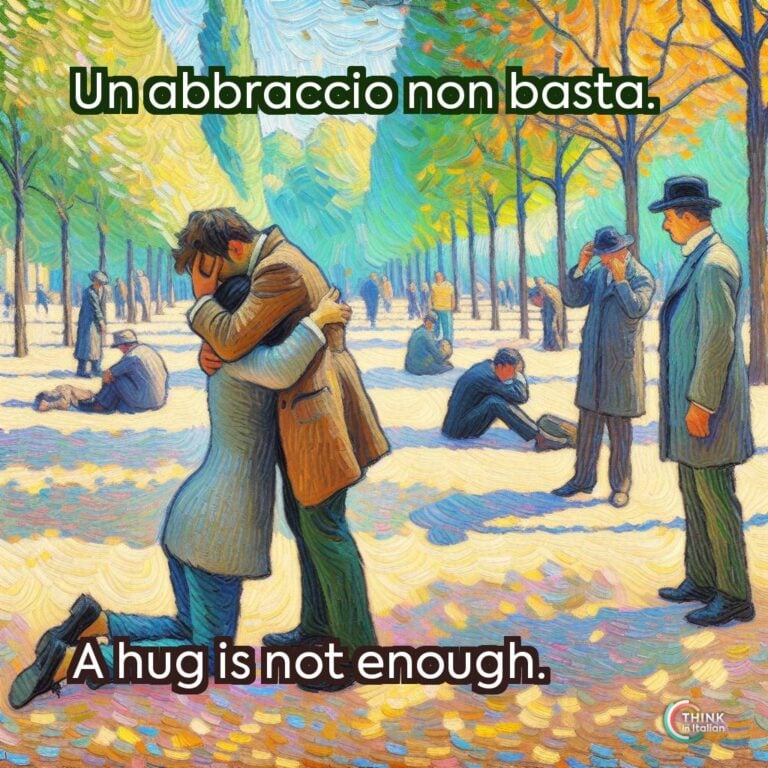How to Say “It’s Enough” in Italian
In Italian, the phrase “it’s enough” is most commonly expressed with the word basta. This word is widely used in various contexts to signal that something is sufficient and no more is needed, or to express frustration.
Basta così, grazie!
That’s enough, thank you!
Mi hai stancato, basta!
You’ve tired me out, enough!
Whether you’re politely indicating that you’re done with something or declaring that you’ve had enough, basta is the expression you need.
Basta
“Bastare” Conjugation
Basta is the third person singular of the verb bastare, which means “to be enough” or “to suffice”. Bastare is an intransitive verb: it can either stand alone, or be linked to an indirect object.
However, it is a regular verb, meaning it follows standard conjugation patterns in Italian. Here I will conjugate bastare in the main verb tenses of the indicative mood:
| Subject | Conjugation |
|---|---|
| Io | basto |
| Tu | basti |
| Lui/Lei | basta |
| Noi | bastiamo |
| Voi | bastate |
| Loro | bastano |
| Subject | Conjugation |
|---|---|
| Io | sono bastato/a |
| Tu | sei bastato/a |
| Lui/Lei | è bastato/a |
| Noi | siamo bastati/e |
| Voi | siete bastati/e |
| Loro | sono bastati/e |
| Subject | Conjugation |
|---|---|
| Io | bastavo |
| Tu | bastavi |
| Lui/Lei | bastava |
| Noi | bastavamo |
| Voi | bastavate |
| Loro | bastavano |
| Subject | Conjugation |
|---|---|
| Io | basterò |
| Tu | basterai |
| Lui/Lei | basterà |
| Noi | basteremo |
| Voi | basterete |
| Loro | basteranno |
How to Use “Bastare” in Italian
Since it is a intransitive verb, bastare can either stand alone or be used with indirect pronouns.
Ti bastano 1o euro?
Are 10 euros enough for you?
Bastano 10 euro?
Are 10 euros enough?
Keep in mind that bastare is conjugated depending on what or who is considered “enough”. This means that the subject varies based on that.
Therefore, indirect pronouns indicate the person according to whom something is enough. For example:
Mi basta un caffè.
One coffee is enough for me.
In this sentence, the verb bastare is conjugated in the third person singular because the subject is caffè, and mi is the indirect pronoun indicating who is satisfied with the coffee.
Ti basta una risposta
One answer is enough for you.
Here, “ti” is the indirect pronoun referring to the person for whom the answer is enough.
The key here is to remember that “bastare” uses indirect object pronouns (mi, ti, gli, le, ci, vi, loro) to indicate the person who finds something sufficient.
When to use “Basta” in Italian
Sufficient Quantity
The verb bastare can be used when you want to indicate that the quantity of something is enough. In these cases, the quantity you are expressing is the subject of the verb:
Basta così, grazie.
That’s enough, thank you.
Bastano venti minuti per finire il lavoro.
Twenty minutes are enough to finish the job.
Basta un po’ di pratica per imparare.
A little practice is enough to learn.
Mi bastate tu e Luca per organizzare la festa.
You and Luca are enough for me to organize the party.
Expressing Emotional Limits
You can also use the expression basta to express emotional limits and declare that you’re done with a situation and can’t take any more. In these cases, basta is always conjugated in the third person singular:
Non ne posso più, basta!
I can’t take it anymore, that’s enough!
This phrase conveys emotional exhaustion or frustration with a situation.
Setting Boundaries
Sometimes, the expression basta works as a forceful declaration. For example, when you’re tired of talking and want to get into action:
Basta parlare, è ora di agire.
Enough talking, it’s time to act.
It is also useful when setting boundaries or limits:
Basta con le scuse!
Enough with the excuses!






